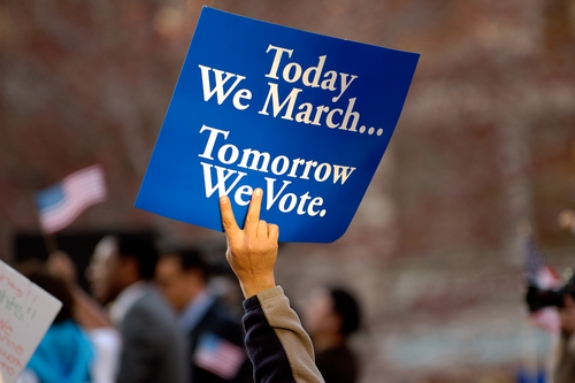
With the exception of Colorado, there aren't that many Latinos living in states with competitive Senate races -- and there are even fewer Latinos living in House districts controlled by Republicans. In a fascinating thought experiment earlier this week, Nate Cohn determined that Republicans could hold a majority in the House without winning a single Hispanic vote.
The Hispanic vote does not appear to be damaging congressional Republican candidates all that much. On the contrary, those voters might be hurting Democrats, who desperately need their enthusiasm and support in some races.
Hispanic voters are frustrated with continued deportations and with what they see as the Democratic Party's failure on immigration reform. Only a narrow majority of Latinos say they approve of the job President Obama is doing, according to Gallup. His approval ratings among Latinos have fallen by 20 points since his reelection in 2012.
Much of the election analysis has been focused on control of the Senate, where Hispanics do have less influence over the outcome. But this year's gubernatorial races are arguably more consequential. In Kansas, for example, Gov. Sam Brownback's tax cuts have left the state with an expanding budget shortfall, but haven't obviously improved the economy.
In a dead heat like Colorado's gubernatorial race, Latino support is crucial. A recent Quinnipiac poll put Gov. John Hickenlooper just one point ahead of his Republican opponent, former Rep. Bob Beauprez. Hispanics constitute fully 14 percent of eligible voters, so it's easy to see how a small change in turnout could sway the election. (About one in three eligible Hispanic voters have voted in past midterm elections, according to the Pew Research Center.)
Last month, one Latino advocacy group threatened to boycott the election, saying a program to issue driver's licenses to undocumented immigrants had been underfunded. All the same, Hickenlooper's campaign has had success in reaching out aggressively to the community, said Matt Barreto of Latino Decisions, a polling firm.
In Kansas, eligible Hispanic voters are only about 6 percent of the electorate, but the gubernatorial race might even closer. The polls are split on whether Brownback will survive a challenge from Paul Davis, a state legislator.
Even in some crucial Senate races, Latinos could be influential, but by not showing up at the polls. Take Sen. Kay Hagan (D-N.C.), whom the advocacy organization Presente Action targeted in a radio spot. Hagan voted with Republicans in a filibuster of the Dream Act in 2010, and more recently, sided with Sen. Ted Cruz (R-Tex.) in a failed procedural vote supporting deportations.
Barreto argues that Hagan's decisions on immigration won’t deliver the kind of swing voters she may have been targeting . Those voters are moderate on immigration anyway, he said, and less than half of Latinos are planning on voting for Hagan, according to his firm's research.
Well-informed Latinos are understandably frustrated with Hagan and other Democrats, Barreto said. If they don't vote, he added, "it’s because they’re paying attention." Most models give Hagan a comfortable, if narrow, lead, and Latinos are only about 3 percent of eligible voters in North Carolina, so she may well survive without the ardent support of the Hispanic community.
The Latino vote might not be decisive in North Carolina or in any other state, the way it could be in 2020, when as many as 25 million more Hispanics will have joined the electorate.
No comments:
Post a Comment